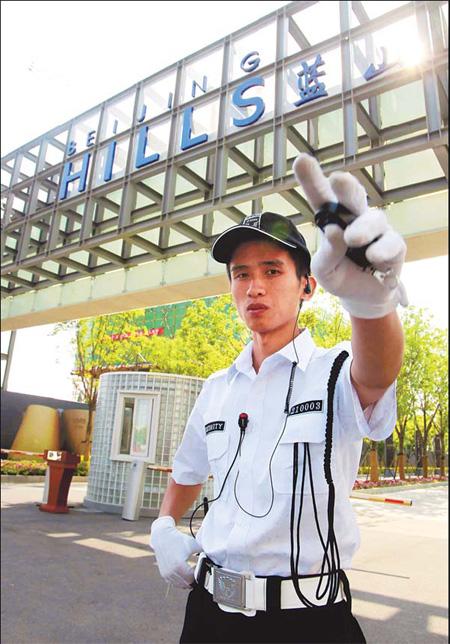
A security guard tries to prevent photographs being taken at the construction site of Beijing Hills community, developed by China Vanke Co. [Wang Jing / China Daily]
An outspoken property tycoon has accused the government of withholding the sales permits of high-price properties to create the appearance of a cooling market.
Ren Zhiqiang, chairman of the Hua Yuan Real Estate Group, claimed Beijing property authority was fooling the public by manipulating prices.
"China Central Television reported a piece of good news this morning, saying Beijing's house prices have fallen 8,000 yuan per sq m," Ren wrote in his micro blog on Tuesday.
"It appeared that the new policies were making significant progress, but they didn't know that Beijing has suspended the issuing of sale permits for high-end properties. Without them, the average price is easily going down."
However, the Beijing municipal commission of housing and urban-rural development, the authority responsible for issuing the certificates, denied Ren's charge.
"The commission strictly adheres to regulations. If the property meets our standards we will issue a permit, but if it fails to qualify, sorry, the real estate dealer will certainly not receive a permit," Yan Ting, the commission's spokesman, said.
From May 1 to May 10, seven property projects have received the pre-sale licenses, including Beijing Hills - a high-end real estate project developed by China Vanke Co with an average asking price of 39,800 yuan per sq m, according to Beijing Real Estate Transaction and Management website. That's just one fewer than the same period last month, when six projects received certificates.
"The government is certain to deny it. But I say it's a fact: many high-end properties failed to receive sale permits recently," Ren Zhiqiang told METRO.
"The purpose is to slow the pace of luxury apartments entering Beijing's market, which will relieve the upward pressure on house prices," Ren said.
Tao Hongbin, president of SYS Win Brokerage, a Chinese property agent, said he thought Ren's point did contain some truth, but it was not necessarily the whole truth.
"It is wrong to say government officials have stopped issuing certificates to high-end properties, but they do conduct a more careful supervision on those projects," Tao said.
Tao admitted he knew that some luxury properties had encountered some obstacles from the government, but he declined to reveal the names of the properties.
"If they ask for a much higher price than other projects nearby, the authority will ask why and demand reasons, or ask them to supply supplementary materials," Tao said.
"For low to medium price properties, the government usually goes through process very quickly, hoping to increase supply."
At least three high-end apartments in Beijing are still waiting for their licenses, China Business, a national Chinese newspaper, reported on Sunday. Their prices are between 35,000 yuan sq m to 40,000 yuan per sq m.
Beijing municipal government introduced the so-called "toughest property regulation in history" on April 30, aiming to rein in speculation and curb the fast growing house prices.
Some real estate institutions reported Beijing's house prices fell by as much as 8,000 yuan per sq m in the following weeks, and said it demonstrated the power of government control. However, some industry analysts argued that this was not the case.
"People said the house price was bei jiangjia, or being artificially dragged down," Zhang Dawei, researcher at Centaline China, said.
In April, the total area of commercial apartments sold in Beijing was 1.19 million sq m, a drop of 41 percent over the same period last year, according to Beijing statistics bureau.
However, the house prices rose by 14.7 percent in April, the 10th consecutive month that prices have risen.





